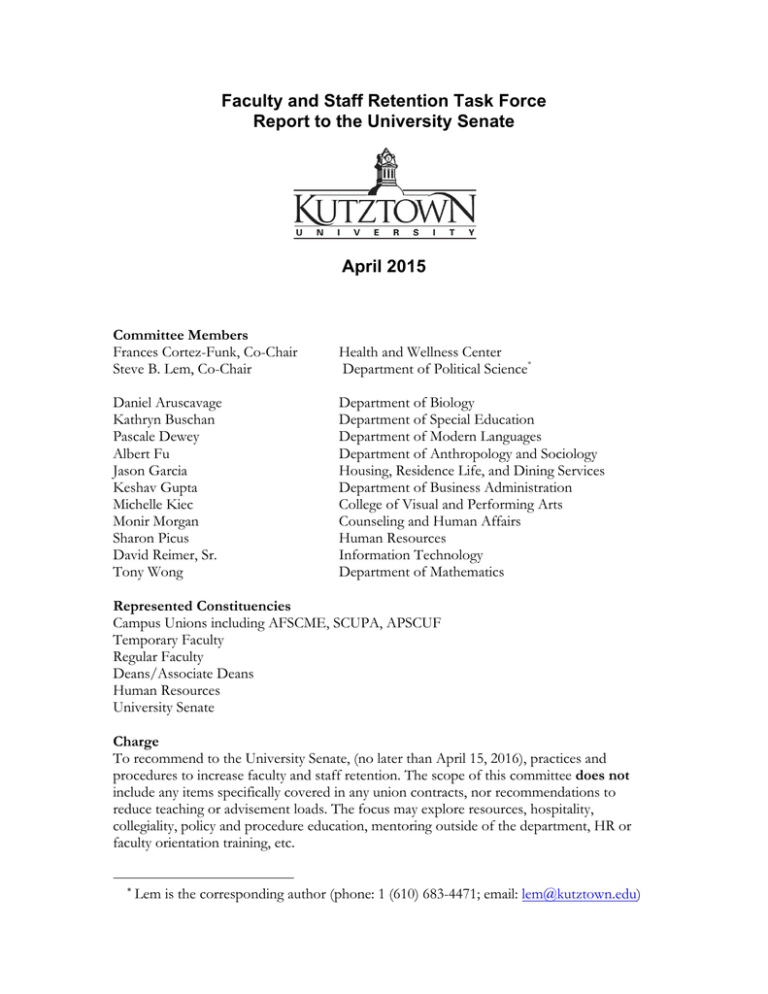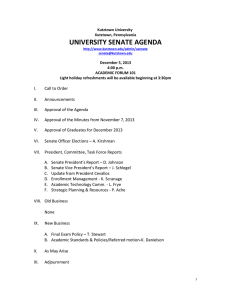Document 11642135
advertisement

Faculty and Staff Retention Task Force Report to the University Senate April 2015 Committee Members Frances Cortez-Funk, Co-Chair Steve B. Lem, Co-Chair Health and Wellness Center Department of Political Science* Daniel Aruscavage Kathryn Buschan Pascale Dewey Albert Fu Jason Garcia Keshav Gupta Michelle Kiec Monir Morgan Sharon Picus David Reimer, Sr. Tony Wong Department of Biology Department of Special Education Department of Modern Languages Department of Anthropology and Sociology Housing, Residence Life, and Dining Services Department of Business Administration College of Visual and Performing Arts Counseling and Human Affairs Human Resources Information Technology Department of Mathematics Represented Constituencies Campus Unions including AFSCME, SCUPA, APSCUF Temporary Faculty Regular Faculty Deans/Associate Deans Human Resources University Senate Charge To recommend to the University Senate, (no later than April 15, 2016), practices and procedures to increase faculty and staff retention. The scope of this committee does not include any items specifically covered in any union contracts, nor recommendations to reduce teaching or advisement loads. The focus may explore resources, hospitality, collegiality, policy and procedure education, mentoring outside of the department, HR or faculty orientation training, etc. * Lem is the corresponding author (phone: 1 (610) 683-4471; email: lem@kutztown.edu) Executive Summary To complete its charge of making recommendations to the University Senate to increase faculty and staff retention by April 2016, the Task Force adopts a three-stage approach to address the problem. Stage 1: Define the Scope of the Problem • Collect and analyze Human Resource (HR) faculty and staff turnover data; • Collect and analyze HR faculty and staff exit survey data; • Collect and compare sister PASSHE institution faculty and staff retention data with Kutztown University; • Complete Stage 1 by May 2015. Stage 2: Identify the Causes of the Problem • Analyze Kutztown University’s Institutional Climate data to identify potential cultural norms affecting faculty and staff retention; • Conduct “Stay” interviews of existing faculty and staff members to identify practices that increase/decrease employee morale and investiture in Kutztown University; • Review the scholarly literature and practices of other institutions to identify other best practices that affect faculty and staff retention; • Complete Stage 2 by December 2015. Stage 3: Generate Policy Alternatives and Select Policy Recommendation(s) to the University Senate • Identify a series of “best practices” to increase faculty and staff retention; • Modify (as needed) list of practices to fit Kutztown University’s institutional and cultural structure; • Analyze and compare options to identify maximum impact policies; • Recommend policies to University Senate; • Complete Stage 3 by April 2016. The following are the principal findings of the HR data analyses completed in Stage 1: • 261 employees left KU from 2009 to 2015; • 188 (72%) of those employees voluntary resigned their position; • The highest number of employees who resigned were from the AFSCME and APSCUF bargaining units; • Fear of retaliation for expressing one’s opinion, open two-way communication at the University-level, and career opportunities were the three biggest challenges identified in the HR Exit Survey data. 2
